
The impact of ecommerce businesses on the environment is a much-debated issue. Ecommerce is a popular choice for consumers because of the convenience it offers them, but that convenience comes at a price.
Most people shop online for everything from their daily needs to luxury items and prefer same-day or one-day delivery. The number of products being shipped on a daily basis is increasing and so is the return rate, which is, in turn, increasing pollution.
Plastic and thermocol, which are non-biodegradable, are widely used for packaging products and are disposed of by customers. They are then openly burnt, which causes health hazards.
It is important that ecommerce businesses make efforts to become sustainable. Being eco-friendly may seem daunting, but it is achievable. Following are the small steps you can take to make your business sustainable:
Create An Eco-Friendly Work Environment
Begin your eco-friendly journey by making sustainable changes to your workplace. Start by cutting down your electricity consumption – switch off lights, fans, and other electronic equipment when they are not in use or use ones with motion sensors. Avoid running air conditioners at low temperatures for long durations. Use LED lights. Put a limit on the amount of printing that is done, or use eco-friendly printing ink made from soy, algae, vegetables, water, or consisting of LED UV.
Make Your Products Reusable
Put goods like clothes, accessories, furniture, toys, etc. to multiple rounds of tests to check their parts. Zippers, clasps, buttons, parts of toys and their remote controls, etc. might seem like small parts but are very important, and you should test them repeatedly. Test the quality of clothes by washing them multiple times – check if they have snags in the fabric or are losing their colours.
Enable your customers to fix products themselves when they break or crack – build the products using easily available hardware or sell their parts on your website, and post DIY repair tips on your social media channels. This will help you to reduce return rates and cut back on the packaging used for shipping fresh products.
Make The Products And Their Packaging Lighter
Packaging waste is a major concern in ecommerce. One mistake that ecommerce businesses make is having a standard box size for products of different sizes. When the packaging is too big for a product, a lot of protective inserts have to be used which customers eventually dispose of. Use fit-to-size packaging to prevent this. Avoid using fillers in the products to add extra weight to them.
Use Eco-Friendly Packaging
Choose recyclable boxes or packaging made from biodegradable materials like corn starch, bagasse paper, etc. instead of cardboard, and avoid box-in-box packaging. Swap bubble wrap and thermocol for packing peanuts. Choose reusable cloth bags over plastic bags.
Incentivise Customers For Choosing Slow Shipping
Same-day delivery is attractive for your customers, but costs dearly to the environment. Multiple items being delivered each day means more vehicles being on the road at the same time, which results in increased air pollution. Encourage your customers to opt for longer delivery periods by offering them discounts.
Go Digital
Encourage your customers to make payments using digital methods like net banking, credit/debit cards, and payment wallets instead of cash. Train your delivery personnel in using these payment methods. Email receipts to customers instead of sending them printouts.
Set up a digital asset management system that your employees can access from anywhere. This will enable them to work from home whenever possible and reduces pollution caused by commute.
Use An Eco-Friendly Web Hosting Service
Speaking of going digital, carrying out transactions online is not enough. There is also a way for you to make your website eco-friendly. You can use a green hosting service provider that uses 100% renewable electricity generated using solar and wind energy to host your website. A green hosting service also costs you less than others.
Support Environmental Causes
Customers support socially responsible brands, and because of the growing support, such brands are proving to be more profitable. Being environmentally conscious not only means practising eco-friendliness within your workplace, but also supporting sustainability organisations in their efforts of creating a greener world.
Knowing that you are using customers’ money to make the world a better place will increase their trust in you, which will in turn increase your business. Your green initiative can be as simple as planting a tree for every purchase or donating a part of your proceeds to an environmental organisation.
Display Your Sustainability Efforts
You can gain the trust of your customers by displaying your sustainability efforts. Design your packaging in shades of green, and use your packaging and website to showcase your environmental certificates, the causes you support, the sources of your raw materials, and your digital efforts.
